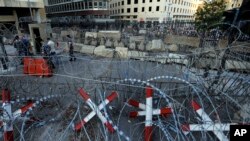As anti-government street protests continue to rock Lebanon’s capital, the country’s political elites are scrambling to find a way to quell rising public anger over alleged government incompetence and graft.
In a crisis that has grown out of lacking municipal services, analysts say there are now signs that a group of lawmakers may be backing the idea of appointing Lebanese army chief Jean Kahwaji as president, a post that has not been filled for more than a year.
Tensions came to a boil over two weeks ago when security forces opened fire on thousands of mainly youthful demonstrators who took to the streets to protest, initially against uncollected garbage piling up in Beirut. The protests quickly spawned a movement with expanded demands that now threatens the fragile sectarian power-sharing arrangements underpinning Lebanon since the end of its 15-year-long civil war in 1990.
On Tuesday, activists from the so-called You Stink movement stormed Lebanon’s environment ministry, escalating a challenge to the country's government and political classes. Protesters demanded the environment minister step down and the minister of interior be held accountable for resorting to force against protesters in previous demonstrations.
Again, there were violent clashes as security forces disrupted one of the activists’ sit-in protests. Outside, riot police skirmished with protesters, who are also calling for new parliamentary elections and the end of a sectarian governance system that sees government posts shared among the main sectarian players while state institutions are kept weak and incapable.
Marwan Maalouf, an activist removed from the ministry, told reporters outside, “We saw today that this government does not want to listen to the people; they want to continue along their own path and ignore the voices of the people.” The protest movement drew its largest crowd to date to central Beirut on Saturday.
‘Just the beginning’
"It's just the beginning,” one of the protesters inside the environment ministry, Imad Bazzi, told the Associated Press.
In the wake of the clashes at the ministry, Lebanese parliament Speaker Nabih Berri has called for a “national dialogue initiative” aimed at resolving the current political turmoil. “We are at our last chance,” he said during a weekly meeting with other Lebanese politicians. "Dialogue is a vital need," the speaker added.
Berri warned citizens that the country is highly vulnerable because of the conflicts raging nearby in Syria and elsewhere in the region. “The Lebanese should safeguard and protect their country from the fires surrounding Lebanon,” he was reported by local media as saying.
Leaders from across the political spectrum welcomed Berri’s call for an all-inclusive political dialogue, which they say would focus on agreeing on a candidate to fill the presidency.
The Future Movement, led by MP Saad Hariri, the younger son of assassinated former prime minister Rafic Hariri, condemned the protesters for “storming the ministry of environment,” saying such methods “serve the interests of those seeking to create chaos in the country.”
Lebanon has been without a president for 15 months because of bickering between the main rival political blocs known as March 8 and March 14, respectively led by the country’s Shia Hezbollah movement and the Sunni-dominated Future Movement. Official posts are divided among the confessional groups, with the presidency held by a Christian and the prime minister and parliament speaker roles going to a Sunni and a Shia Muslim. Agreement on who should be president has proven elusive.
Kahwaji option divisive
March 14 sources say that army chief Kahwaji is now being touted heavily, and his election by lawmakers may be acceptable to both Iran and Saudi Arabia, key regional players in Lebanon.
Michel Aoun, a former Lebanese army commander himself and the head of the Free Patriotic Movement, the largest Christian party, has been demanding the presidency but may back down if his son-in-law, Brig. Gen. Chamel Roukoz, is appointed to replace Kahwaji as head of the armed forces, Sunni politicians say. They declined to be named in this report.
Deal-making behind closed doors may not satisfy the swelling Arab Spring-style You Stink movement, a loosely knit alliance of NGOs and civic groups led by activists, bloggers and artists, who are determined to shake up Lebanese politics and break the political monopoly of the old guard. The movement, which has been compared to the student groups behind the 1968 protests in Paris, scorns the cronyism and spoils sharing of the traditional Lebanese system.
While the politicians are betting that the appointment of a president will help solve the crisis, activists say any election by lawmakers of a new head of state would be flawed as it would be the act of a parliament that has already twice extended its electoral mandate. They are calling for parliamentary elections, with some demanding the immediate resignation of the government of Prime Minister Tammam Salam, whom many see as having assumed presidential responsibilities.
You Stink organizers say they are aware previous street protest movements that sought to overhaul the political system and do away with sectarianism have lacked major public traction and collapsed as the old politics reasserted itself, exploiting political and religious division. As the movement swells, those risks are likely to grow.
Not all groups involved agree with the call for the government to resign, fearing that would plunge the country into dangerous chaos, and the key organizers have tried to focus their main demands on narrowly defined issues that have practical solutions.




